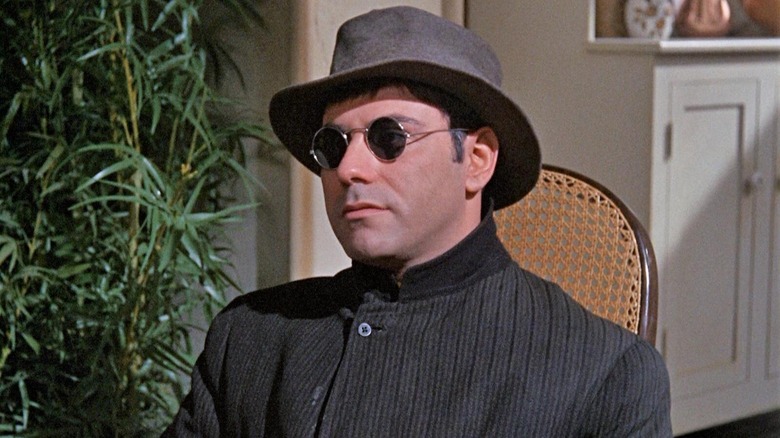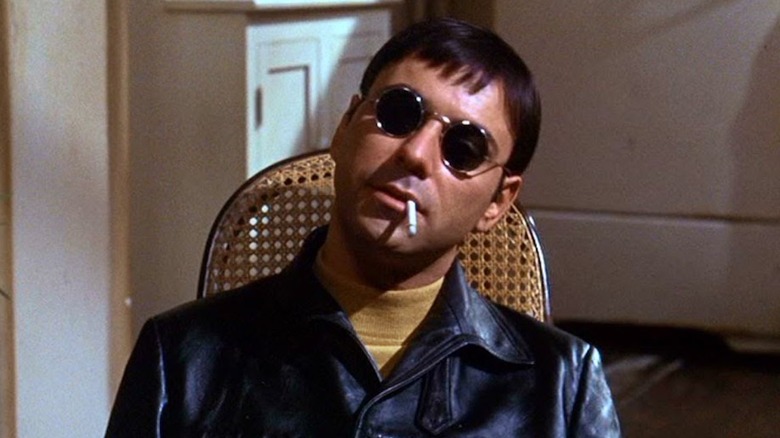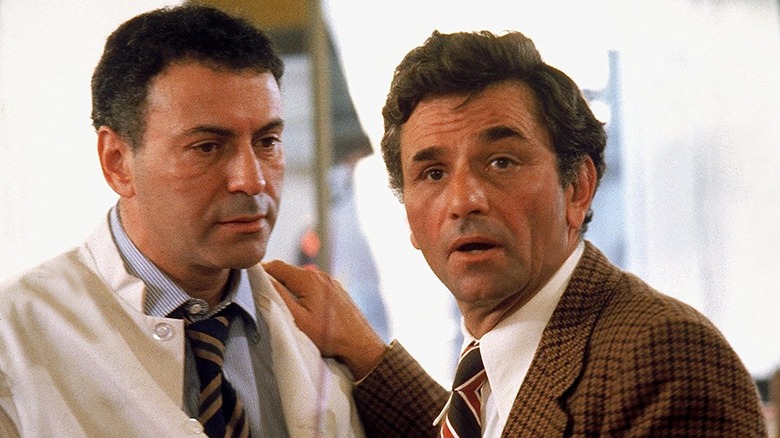How Alan Arkin's Two Greatest Roles Reveal His Range As An Actor
"When I was a young actor people wanted to know if I wanted to be a serious actor or a funny one. I'd answer 'Which kind is Alan Arkin?' and that shut them up." – Michael McKean
Alan Arkin, who died today at the age of 89, truly was an actor's actor. He wasn't showy, and he generally didn't go in for appearance-altering prosthetics. At 5'9" he wasn't a physically imposing presence, nor was he a remarkably handsome man. When he was being himself, he looked and sounded like your gently sarcastic coworker or science teacher or doctor; when he got older, that demeanor morphed into what Jon Hamm, who worked with Arkin on "Million Dollar Arm," called "the gruff, grumbly uncle kind of deal." This was the Arkin baseline, and it was never less than a joy to watch him just be.
But Arkin was adored by his fellow actors because he could be anything. He could get a laugh just as easily as he could induce dread. He could be avuncular in one film, then play a straight-up psychopath in the next. He projected a wry intelligence that drew you in regardless of his character's mental state, even in misdirected 1980s flops like John Cassavetes' "Big Trouble" or Harvey Miller's "Bad Medicine." He let the material and the moment come to him, and mastered the art of listening to his scene partners because acting isn't fun or pleasurable to watch when people are merely talking at each other.
Perhaps Arkin's most important quality, especially early in his career, was his curiosity. He chose roles that were quite unalike, and was delightfully turned on by these characters' sharply conflicting qualities. It's difficult to choose just two standout performances from his 1966-1980 prime, but if you want to see the full range of this singular actor, you can't find two more diametrically opposed portrayals than Harry Roat in Terence Young's "Wait Until Dark" and Sheldon Kornpett in Arthur Hiller's "The In-Laws."
The playful evil of Harry Roat
Based on Frederick Knott's hit Broadway thriller, "Wait Until Dark" finds Alan Arkin cast as a sadistic criminal who, with the assistance of two con men, preys on the blind Susy Hendrix (Audrey Hepburn), who has unwittingly come into possession of a doll stuffed with heroin. They play games with Susy, posing as multiple people to trick her into turning over the goods.
Richard Crenna and Jack Weston are suitably unsettling as the scheming Mike Talman and Carlino, but Arkin's Roat is a terrifying presence who gets off on manipulating and, eventually, torturing Susy. Clad in a black leather jacket and black sunglasses, Arkin oozes menace as Roat. He's a remorseless killer who anticipates his co-conspirators' betrayal, and, most chillingly, relishes the cat-and-mouse game he's got going with a blind woman.
Hepburn is perfect casting here because of her Hollywood sweetheart status. We can't bear to see her put through this vile ordeal, and we're especially repulsed by the glee Arkin takes in playing these mind games. He hurls himself into the theatricality of his invented characters, the most amusing of which is the blustery Roat Sr. But once he's knocked off his associates and placed himself squarely in the driver's seat, we're treated to an absolutely skin-crawling moment where Roat brushes Hepburn's face with a gauzy veil as he inquires after the location of the doll.
From murderer to sheer mayhem
Throughout "Wait Until Dark," Alan Arkin adopts a New York street-tough accent that occasionally drops into a self-satisfied purr. Again, it's the pleasure Roat takes in toying with Susy that amps up the terror in the film. Bad guys are catnip for most actors, but Arkin's too fascinated by Roat to engage in stock, mustache-twirling villainy. By the end of the film, he makes Roat a frighteningly full-blooded monster. It was the last thing audiences expected from a man who won a Best Featured Actor Tony for his howlingly funny performance in "Enter Laughing." And it's hard to believe that Arkin could do what he did so brilliantly in "The In-Laws."
Andrew Bergman's screenplay for "The In-Laws" is a master class in comedic escalation. The film takes a cliched premise — two engaged youngsters introduce their parents to disastrously adversarial effect — and turns it into a zany spy comedy that sends the two fathers on a globetrotting adventure that ends in a fictional Central American country.
Arkin's Sheldon "Shelly" Kornpett is a mild-mannered dentist who's concerned that his daughter might be marrying into a criminal family. He's half-right. Peter Falk's Vince Ricardo is a CIA operative who robbed the United States Mint to aid his investigation of an international inflation plot. Falk portrays Vince as a largely unflappable clown who's got his country's best interests at heart, while Arkin hits the roof time and again as a man who wants only for his daughter's safety (which seems imperiled given her father-in-law-to-be's profession).
Serpentine! Serpentine!
The tightly coiled malignance of Rout is nowhere to be found in Alan Arkin's "In-Laws" performance. Shelly's lightly neurotic demeanor turns incandescently indignant. When he learns Vince has inadvertently involved him in his plot, Shelley rages. ("Why am I getting so excited? The central piece of evidence in the biggest federal crime since the atomic spy case is sitting in my basement, and you want to know why I'm getting excited!") When Vince tries to calm him down, Arkin gives a line-reading for the ages with, "I want that thing out of my house!" It's his pronunciation of "how-oose" that kills me every time.
Arkin appears to be having a ball opposite Peter Falk. Meanwhile, we're getting a kick not just out of Arkin being Arkin, but knowing there were so many ways to be Arkin. He'd eventually settle into that "grumbly uncle kind of deal" in the 1990s, which was mostly a treat as well (he strikes these notes with a thud in the atrocious "Little Miss Sunshine"), but the Arkin of the '60s and '70s was a gloriously varied feat of performance that dependably brought down the "how-oose." He was every kind of actor.



